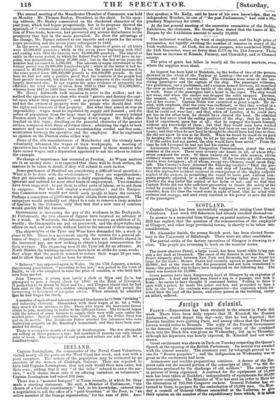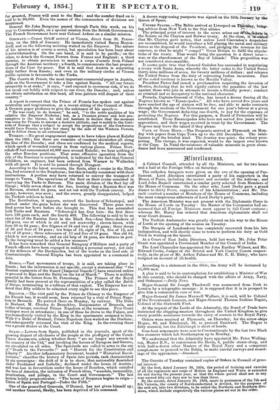lartign out toluniat.
FBA/MS.—Expectation has been strained to the utmost in Paris this week. There have been daily reports that M. Kisseleff the Russian Ambassador, would depart this day—nay, that he had departed; that Russian families were quitting Paris, and among others that the Princess Lieven would retire to Brussels. The reply of the French Government to the demand for explanations respecting the entry of the combined fleets into the Black Sea was given on Wednesday ; but up to Thursday, although his departure was hourly expected, M. Kisseleff had not with- drawn. Great excitement was shown in Paris on Tuesday respecting the Queen's Speech at the opening of the British Parliament. Its arrival was awaited with the utmost anxiety. The summary sent by telegraph proved to be one for "Bourse purposes " ; and the indignation on Wednesday was as great as the excitement had been.
Armaments and warlike preparations continue. A decree of the Em- peror calls out the second portion of the conscripts of 1851, "to fill the vacancies produced by the discharge of old soldiers." The cavalry are in process of being organized. A contract for the equipment of 15,000 men has been taken at Rochfort; independently of equipments for 20,000 more now complete. The Minister of War has sent an order to Metz for the fabrication of 235,000 Congreve rockets. General Pelletier has re- turned to Oran, to prepare for the embarkation of 10,000 men. On Mon- day a council of General Officers assembled at the Tuileries, to give their opinion on the inintber of the expeditionary force which, it is taken for granted, France will send to the Rant; and the number fLved on is said to be 80,000. Even the names of the commanders of divisions are mentioned.
General Sir John Burgoyne passed through Paris this week, on his way to Constantinople, on a special mission from the British Government. The French Government have sent Colonel Ardent on a similar mission.
GERMANY.—Count Orloff arrived at Vienna, direct from St. Peters- burg, on the 28th of January. He immediately visited Baron Meyen- (Ruff, and on the following morning waited on the Emperor. The nature of his mission is of course a secret, but speculation has been busy about it notwithstanding. On the one hand, it is said to be pacific ; on the other, to detach the German Powers from France and England ; a third surmise' to obtain permission to march a corps d'armee from Poland through the Austrian territory ; a fourth, to communicate the last proposi- tions of the Czar for peace. But it is said that Austria is separating daily farther from Russia; and even in the military circles at Vienna public opinion is favourable to the Turks.
The Gazette (le Trieste, the most important commercial paper in Austria, • calls on the Government to take a line against Russia. "All our future prosperity is at stake," it says, "and exposed to enormous risk, if we do not speak out boldly with respect to our river, the Danube ; and, unless we obtain satisfaction on this head, all true patriots will despair of their country."
A report is current that the Prince of Prussia has spoken out against neutrality and tergiversation, at a recent sitting of the Council of State. A German paper professes to give the substance of his speech-
" He was ready to do honour," he said, "to the noble qualities of his relative the Emperor Nicholas ; but., as a Prussian prince and heir pre- sumptive to the throne, he did not hesitate to declare that the moment was come for Prussia to assume a decisive attitude, and to notify to the Cabi- nets of Europe that a refusal to accept the propositions of the Conference would force Prussia to take her stand by the side of the Western Powers, and to follow them to all extremities."
TURKEY. —No great engagement appears to have taken place at Kalafat since the 10th; but there are rumours of constant skirmishes all along the line of the Danube; and these are confirmed by the medical reports, which speak of wounded coming in from various places. Prince Gort- schakoff had concentrated 45,000 men around Kalafat; we hear nothing of the other Russian positions. That some offensive operation from the side of the Russians is contemplated, is indicated by the fact that General Schilders, an engineer, had been ordered from Warsaw to Wallachia with all speed. It is said he passed through Hungary.
According to the latest accounts, the fleets, after a cruise in the Black Sea, had returned to the Bosphorus ; but this is hardly consistent with their instructions. A portion may have returned to convoy the transport of troops to Varna. The operations of the fleet on their cruise consisted in convoying the Turks to Batoum. The main division of the fleet lay off Sinope ; while seven ships of the line, hearing that a Russian fleet was at Batoum, shotted its guns, and set out with the Turkish convoy. No enemy, however, was seen ; and the crews, greatly disappointed, helped the Turkish soldiers to land.
The Retribution, it appears, entered the harbour of Sebastopol, and arrived under the guns before she was discovered. Three guns were fired across her bows before she brought to. This feat has astonished both Turks and Russians. "Sebastopol has four forts : the first three have 120 guns each, and the fourth 400. The following is said to be an exact list of the Russian !One in the Black Sea—four three-deckers of 120 guns, one of which is old and not seaworthy ; eleven liners, with from 80 to 84 guns ; five frigates of 51 and two of 48 guns; three sloops of 36 and four of 24 guns ; ten brigs of 18, eight of 14, five of 12, and five of 10 guns ; three schooners of 12 and five of 10 guns. One old 84, which is not seaworthy, and an old brig of 24 guns, are fixtures in port. To the foregoing must be added a few steamers." It has been remarked that General Baraguay d'Hilliers and a party of French officers have been engaged in making a personal survey, not only of the defences of the Dardanelles, but of the works on the land side of Constantinople. General Klapka has been appointed to a command in Asia.
Rirssia.—Vast movements of troops, it is said, are takbig place in Russia ; but the information is not specific except a statement that "the Russian regiments of the Guard [Imperial Guards?] have received orders to proceed to Riga and the Baltic on the 1st of March." There is nothing peaceful in the letters from St. Petersburg. The Princes of the Royal Family had been present at the representation of a play called the Battle of &sive, terminating in a tableau of that exploit. The Emperor has or- dered that fifty soldiers be admitted every night to see this piece.
BELGIUM—The visit paid by the Prince de Chimay to the Emperor of the French has, it would seem, been returned by a visit of Prince Napo- leon to Brussels. He arrived there on Monday by railway. The Duke de Brabant, M. Charles de Brouckere, Burgomaster of 'Brussels, and bodies of troops, received Prince Napoleon at the terminus. Five Court carriages were in attendance ; in one of these he drove to the Palace' and was immediately visited by the King in the apartments assigned to him. With the Duke of Brabant, Prince Napoleon then waited on the Duchess ; and subsequently returned the visit of the King. In the evening there Was a grand dinner at the Court.
SPAIN.—Letters from Spain, published in the journals, speak of the growing disgust of all classes of the people at the profligacy of the Court. Fierce documents, asking whether there "are no longer any swords in the country of the Cid," and invoking the heroes of Zaragosa and Gerona, are circulated on all sides. The Spaniards are called to arms to the cry of "Death to the Favourite !" and "Hurrah for the Constitution and Liberty!" Another inflammatory document, headed "Historical Recol- lections," classifies the history of Spain into periods, each characterized by six sovereigns : the drift of it is to show, that nationality flourished under Ferdinand and Isabella ; declined under the house of Austria ; and was lost in favouritism under the house of Bourbon, which entailed the lose of America, the intrusion of French ideas, "scandals, immorality, prostitution, and pillage, in the Court and Government." The last section boldly prognosticates: "The house of Braganza begins to reign— Union of Spain and Portugal—Pedro the Fifth."
One of the proscribed Generals, O'Donnel, has not given himself up; and another General, Shelly, has been deprived of his command.
A decree suppressing passports was signed on the 25th January by the.
UNFTED STATES.—The Baltic arrived at Liverpool OR Thirtiday, 'bring-
ing adviees from New York to the 21st ultimo. _ The principal point of interest in the news arises out • -.
the Senate on the Clayton and Bulwer treaty. At the close, it that Mr. Clayton gave notice, that unless Lord Clarendon's despatches are reconsidered, he would introduce a bill placing the naval and military forces at the disposal of the President, and pledging the revenue for the expense, so that he might " compel " Great Britain to fulfil the stipula- tions of the treaty. That would bring the question. to a direct issue— war, or the abandonment of the Bay of Islands ! This proposition was not considered statesmanlike.
It seems quite true that General Gadsden has succeeded in negotiating a treaty with Santa Anna, whereby the latter cedes to the United States thirty-nine millions of acres, for twenty millions of dollars ; and releases the United States from the duty of repressing Indian incursions. Part of the ceded territory is known as the Mecilla Valley. President Pierce had issued a proclamation respecting the invasion of Mexico, declaring that he will rigidly enforce the penalties of the law against those who join in attempts to invade a friendly power; conduct so criminal and so derogatory to the national character. Pezuela, Captain-General of Cuba, has issued a decree freeing all the Negroes known as "Emancipados." All who have served five years and have reached the age of sixteen will be free, and able to make contracts through the medium of the Government for one year's labour at a given wage; the Government deducting one-fourth, to pay for the expenses of
protecting the Negroes. For this purpose, a Board of Protection will be established. Those Emancipados who have not served five years will be apprentices, and their wages received in trust by the Government. The Negroes may leave the island if they please.
CAFE OF GOOD HOPE. —The Propontis arrived at Plymouth on Mon- day with papers from Cape Town up to the 23d December. The intel-
ligence is of the briefest kind. The frontier was quiet; the colony pros- pering. the vintage, it was expected, would be the largest ever known at the Cape. In Natal the existence of valuable minerals in great abun- dance bad been amiounced and confirmed. Queen of Spain.



































 Previous page
Previous page